| Introduction |
At the beginning of March we held the N2Africa annual planning meeting in Mbale, Uganda together with our Advisory Committee. The meeting was held concurrently with the TAMASA (Taking Maize Agronomy to Scale in Africa) project. Participants from both projects were divided among four groups of about 20 people for “learning journeys” in the field. This gave a great opportunity for joint learning about the opportunities and constraints of taking technologies. ...
|
1 |
| N2Africa in Malawi – achieving sustainable input supply |
|
Our N2Africa Country Coordinator for Malawi, Lloyd Phiphira, introduced me to Fredrick Kawalewale of Agro-Input Suppliers Limited (AISL). This company supplies seed and inoculants to smallholders. Fredrick has been working with N2Africa related to input supply since we began in Malawi in 2010. Given the obvious benefits of rhizobium inoculant with soyabean and the lack of inoculant supply he saw a business opportunity and was prepared to take the risk to set up a company to produce and sell inoculants. ...
Photo: Fredrick proudly holding a sachet of Nitrofix
|
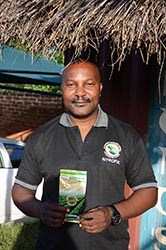 |
|
2 |
| A flavour of the N2Africa Annual Planning Meeting and field trip in Uganda |
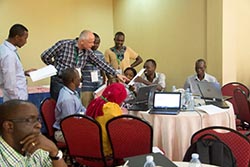 |
The N2Africa Annual Planning Meeting, held in Mbale from February 25th to March 3rd, focused on exchanging learnings and experiences throughout all countries in N2Africa over the past year, and gave the opportunity to tailor the planning for the remaining years in the project. For the Tier 1 countries that is only 9 months from the meeting onward and for the Core countries there are still 2 years to go. ...
Photo: Interactions during the planning sessions
|
|
3 |
| Key achievements 2016 |
- Capacity strengthening to sustain delivery; ...
- Entry step for adoption of technologies; ...
- Last mile delivery of inputs; ...
- Demonstrated output markets opportunities; ...
- Entry point to reduce drudgery; ...
- Quality control for risk-reduction; ...
- Harvest of agronomic research evidence; ...
- Partnerships as springboard for rapid achievements; ...
- Systematic steering and timely learning loops. ...
|
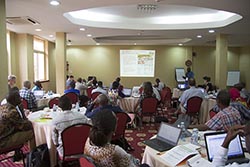
Sessions countries presenting their 2016 results
|
|
4 |
| Innovation and systematic change towards achieving impact at scale |
Outlooks and focus for 2017 will be on:
- Leveraging resources through partnerships; ...
- Expanding partners and area of coverage; ...
- Stimulating private sector participation for input delivery; ...
- Linking farmer groups to access output markets; ...
- Program management and systematic learning loops. ...
|
5 |
| Field learning visits to N2Africa project action sites in eastern Uganda |
|
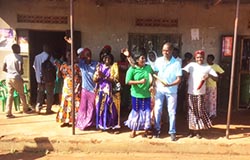
|
On 1st March 2017, almost 80 workshop participants attended a field learning visit for the N2Africa and TAMASA projects. The learning visit aimed to provide the participants the opportunity of learning about the project implementation progress and through reflections, establish personal and collective learning for better implementation. Moreover, having both projects participants go together on the learning visit, allowed cross learning.
Photo: Impression of the visit to Koena Cooperative society, Bukedea District
|
|
6 |
| Private-Public Partnership improves farmers’ access to legume fertilizers in northern Ghana |
|
Grain legume production in northern Ghana is characterized with low yields due to declining soil fertility, inadequate use of farm inputs and lack of good quality inputs including certified seeds, phosphorus fertilizers and rhizobium inoculants.
A contribution on partnerships and a success story.
Figure: Diagrammatic representation of input distribution and marketing of soyabean model
|
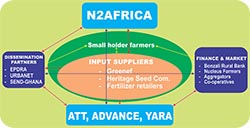 |
|
7 |
| Soyabean farmers in Ghana face challenges in the sale of their produce |
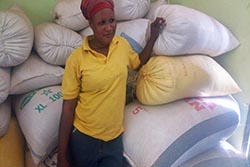 |
Soyabean has become an important crop in northern Ghana over the past decade, where it is grown mainly by smallholder farmers. It is an important source of edible oil and source of high quality protein for both human and livestock. The residues after extracting the oil is an excellent source of high quality protein for the poultry, pig and the fish industries where it is in high demand. ...
Photo: Bags of unsold soyabean grains in a farmer’s store room in Yendi, Ghana
|
|
8 |
| N2Africa Ethiopia conducted its Fourth Annual Partners’ Review and Planning Workshop |
|
N2Africa-Ethiopia has successfully conducted its Fourth Annual Partners’ Review and Planning Workshop during 16-17 March 2017 at ILRI Addis Ababa Campus. The Workshop has provided a National Learning and Experience sharing Platform for N2Africa Ethiopia partners from the four N2Africa target regions; Amhara, Benishangul Gumuz, Oromia and SNNPR. The workshop was conducted under the theme “Moving forward the legume technology and value chain for sustainable development”. ...
Photo: “Bus Stop” poster presentations from Jimma by Beza Erko
|
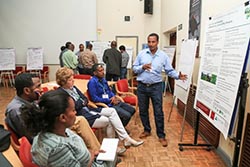
|
|
9 |
| Common bean yield potential and yield gaps in Ethiopia and Tanzania |
|
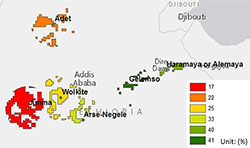
|
Common bean is an important crop in Ethiopia and Tanzania but the national average yield is small (respectively 0.9, and 0.8 ton ha-1; source FAO), indicating that large opportunities exists for intensification of common bean production systems. Assessment of yield potential and yield gaps could help to provide insight in opportunities to increase productivity of common bean.
Figure: Relative yields (actual yield/water limited potential yield*100) of common bean in different regions in Ethiopia. Red indicates low relative yield, and green a high relative yield.
|
|
10 |
| A paradigm shift from grassroots to agribusiness focus in west Kenya |
|
As we enter the final year of N2Africa Phase 2 activities, the outreach team in west Kenya shifts strategically from promotion of BNF technologies at the grassroots level to working more closely with the agribusinesses that produce and market them. This move reinforces the commercial momentum in the delivery of BNF products, particularly inoculants, blended fertilizers and certified legume seed, beyond the project’s lifetime. Toward this end, ...
Photo: Participants at the launch of the One Stop Shop Operation Mechanism (OSSOM) in west Kenya, March 2017
|
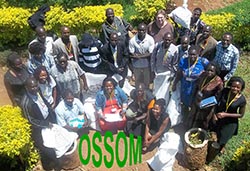 |
|
11 |
| Other N2Africa activities |
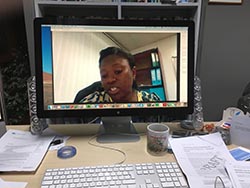 |
On behalf of N2Africa Theresa Ampadu-Boakye and Ken Giller contributed to the Virtual Symposium “Nitrogen: At the Nexus Between Food Security and Sustainability”. About 100 participants worldwide joined.
Ken Giller also presented N2Africa in a WURtalk at Wageningen University & Research for 100 interested people. His lecture, under the subject Nature's Nitrogen, was entitled N2Africa - When technology escapes the laboratory. This lecture will be available on the internet soon.
|
|
12 |
| Related newsletters |
CIAT blog: Platform for Big Data in Agriculture;
Tropical Legumes III updates: Strengthening the groundnut value chain in Uganda and Tropical Legumes III: Strategies for wider reach and deeper impacts;
Soybean Innovation Lab Newletters : February and March 2017;
Africa Soil Health: OFRA: Announcing new book on Fertilizer Use Optimization in Sub-Saharan Africa;
GALA newsletter no. 2;
And more...
|
13 |
| Announcements |
Feeding a Hungry Planet: Agriculture, Nutrition and Sustainability
A new MOOC. This 7-weeks free online course from SDG Academy has started last week, but you can still participate! Enroll here!
West Africa Fertilizer Agribusiness Conference 2017
Focus is on demand creation for fertilizer and agribusiness across Africa.
|
14 |











